unit 2 Daily life 单元复习课件30张PPT
文档属性
| 名称 | unit 2 Daily life 单元复习课件30张PPT |
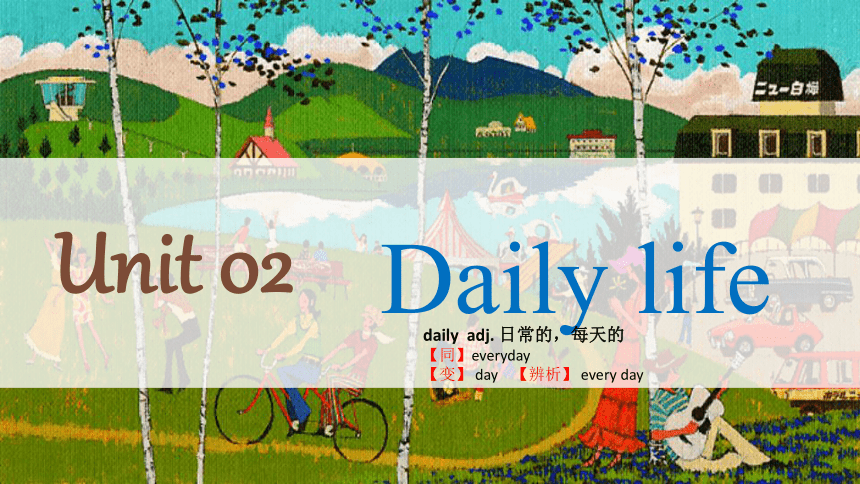
|
|
| 格式 | pptx | ||
| 文件大小 | 4.4MB | ||
| 资源类型 | 教案 | ||
| 版本资源 | 牛津深圳版 | ||
| 科目 | 英语 | ||
| 更新时间 | 2021-07-22 00:00:00 | ||
图片预览


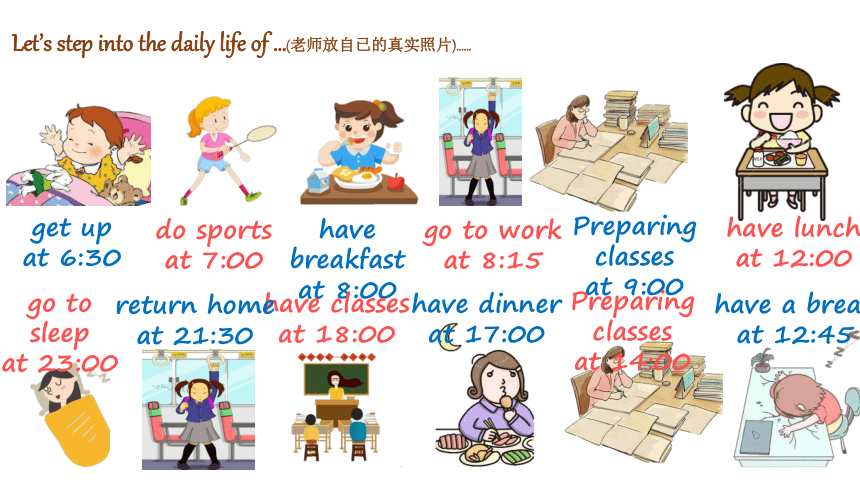

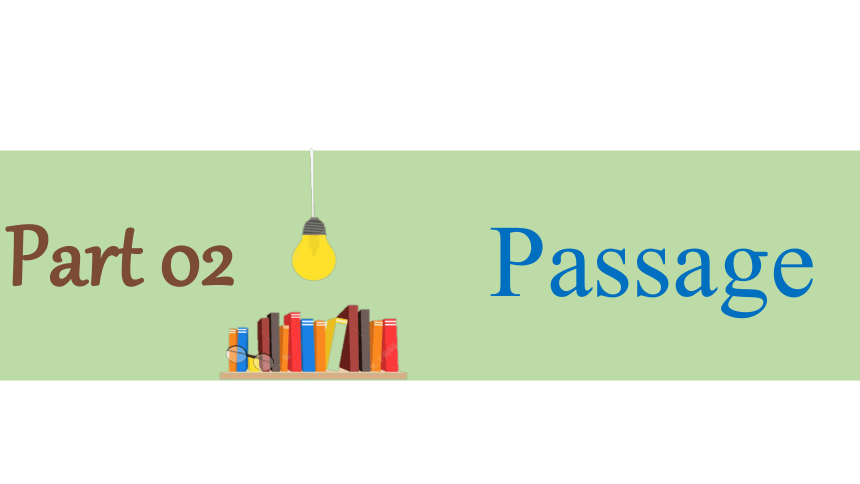
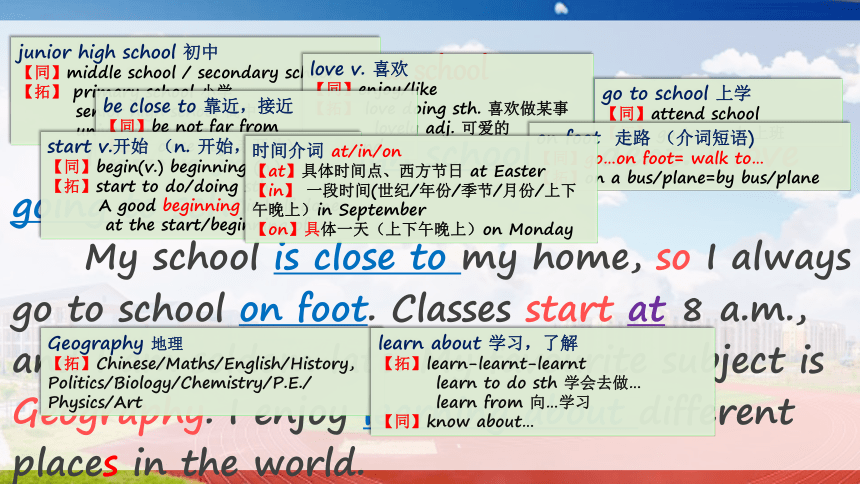
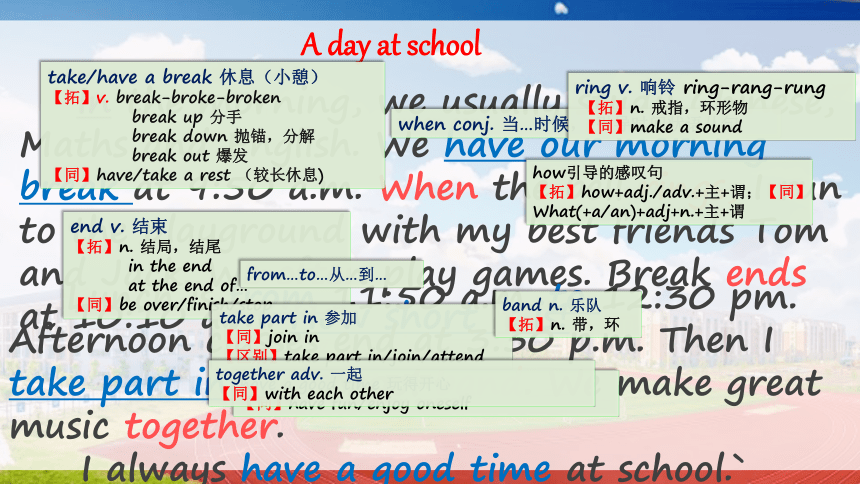
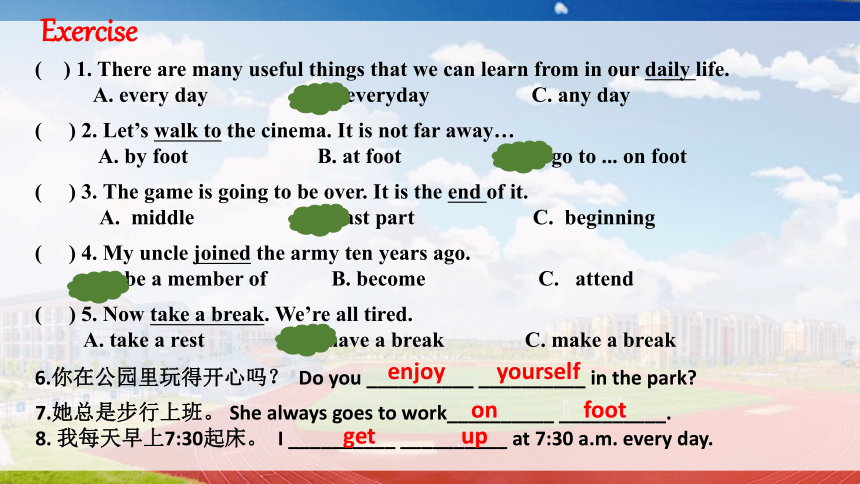
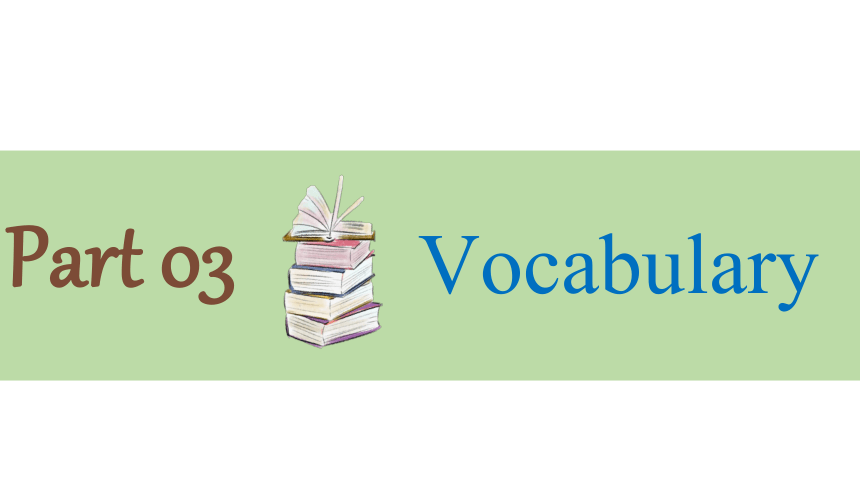
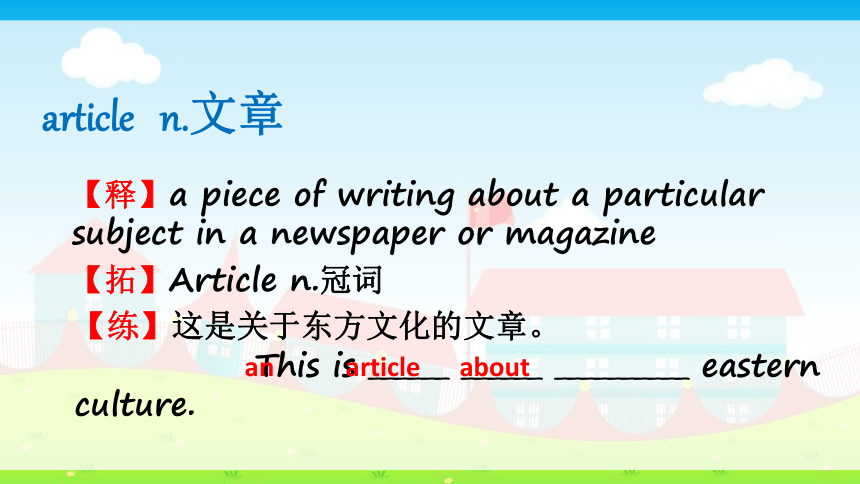
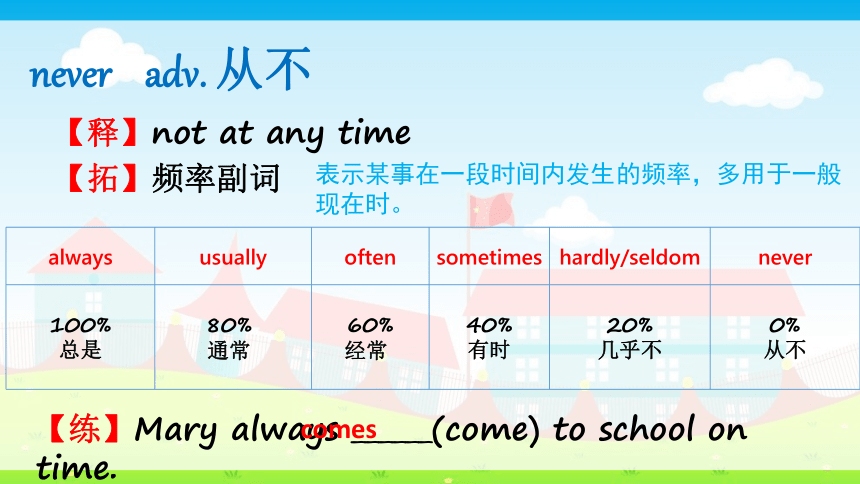
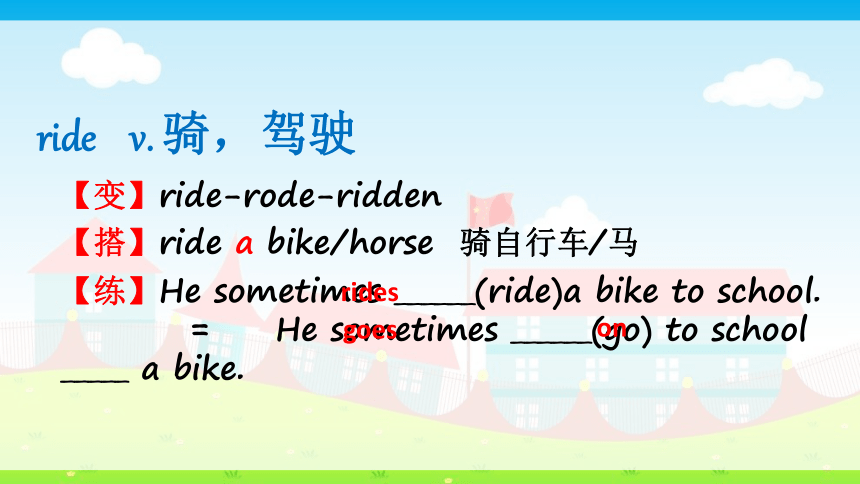
文档简介
Unit 02
Daily life
daily adj. 日常的,每天的
【同】everyday
【变】 day 【辨析】 every day
Part 01
Lead in
Let’s step into the daily life of …(老师放自已的真实照片)……
get up
at 6:30
do sports
at 7:00
have breakfast
at 8:00
go to work
at 8:15
Preparing classes
at 9:00
have lunch
at 12:00
have a break
at 12:45
Preparing classes
at 14:00
have dinner
at 17:00
have classes
at 18:00
return home
at 21:30
go to sleep
at 23:00
What about your daily life? Share something different from your classmates…
A day of middle school students in Shenzhen
Part 02
Passage
A day at school
I am a junior high school student. I love going to school.
My school is close to my home, so I always go to school on foot. Classes start at 8 a.m., and I am seldom late. My favourite subject is Geography. I enjoy learning about different places in the world.
junior high school 初中
【同】middle school / secondary school
【拓】 primary school 小学
senior high school 高中
university/college 大学
love v. 喜欢
【同】enjoy/like
【拓】 love doing sth. 喜欢做某事
lovely adj. 可爱的
go to school 上学
【同】attend school
【拓】 go to work 上班
be close to 靠近,接近
【同】be not far from
【拓】 close adj. 亲密的 close friend
on foot 走路 (介词短语)
【同】go…on foot= walk to…
【拓】on a bus/plane=by bus/plane
start v.开始 (n. 开始,开头)
【同】begin(v.) beginning (n.)
【拓】start to do/doing sth.
A good beginning is half done.
at the start/beginning of…
时间介词 at/in/on
【at】具体时间点、西方节日 at Easter
【in】 一段时间(世纪/年份/季节/月份/上下午晚上)in September
【on】具体一天(上下午晚上)on Monday
Geography 地理
【拓】Chinese/Maths/English/History, Politics/Biology/Chemistry/P.E./ Physics/Art
learn about 学习,了解
【拓】learn-learnt-learnt
learn to do sth 学会去做…
learn from 向…学习
【同】know about…
A day at school
In the morning, we usually study Chinese, Maths and English. We have our morning break at 9:50 a.m. When the bell rings, I run to the playground with my best friends Tom and Jack. We often play games. Break ends at 10:10 a.m. How short it is!
Lunch is from 11:50 a.m. to 12:30 pm. Afternoon classes end at 3:30 p.m. Then I take part in the school band. We make great music together.
I always have a good time at school.`
take/have a break 休息(小憩)
【拓】v. break-broke-broken
break up 分手
break down 抛锚,分解
break out 爆发
【同】have/take a rest (较长休息)
when conj. 当…时候, 引导时间状语从句
ring v. 响铃 ring-rang-rung
【拓】n. 戒指,环形物
【同】make a sound
end v. 结束
【拓】n. 结局,结尾
in the end
at the end of…
【同】be over/finish/stop
how引导的感叹句
【拓】how+adj./adv.+主+谓;【同】What(+a/an)+adj+n.+主+谓
from…to…从…到…
take part in 参加
【同】join in
【区别】take part in/join/attend
band n. 乐队
【拓】n. 带,环
have a good time 玩得开心
【同】have fun/enjoy oneself
together adv. 一起
【同】with each other
Exercise
( ) 1. There are many useful things that we can learn from in our daily life.
A. every day B. everyday C. any day
( ) 2. Let’s walk to the cinema. It is not far away…
A. by foot B. at foot C. go to ... on foot
( ) 3. The game is going to be over. It is the end of it.
A. middle B. last part C. beginning
( ) 4. My uncle joined the army ten years ago.
A. be a member of B. become C. attend
( ) 5. Now take a break. We’re all tired.
A. take a rest B. have a break C. make a break
6.你在公园里玩得开心吗? Do you __________ __________ in the park?
7.她总是步行上班。 She always goes to work__________ __________.
8. 我每天早上7:30起床。 I __________ __________ at 7:30 a.m. every day.
enjoy yourself
on foot
get up
Part 03
Vocabulary
article n.文章
【释】a piece of writing about a particular subject in a newspaper or magazine
【拓】Article n.冠词
【练】这是关于东方文化的文章。
This is ______ ______ __________ eastern culture.
an article about
never adv. 从不
【释】not at any time
【拓】频率副词
表示某事在一段时间内发生的频率,多用于一般现在时。
{BC89EF96-8CEA-46FF-86C4-4CE0E7609802}always
usually
often
sometimes
hardly/seldom
never
100%
总是
80%?
通常?
60%
经常?
40%
有时
20%
几乎不
0%
从不
【练】Mary always ______(come) to school on time.
comes
ride v. 骑,驾驶
【变】ride-rode-ridden
【搭】ride a bike/horse 骑自行车/马
【练】He sometimes ______(ride)a bike to school.
= He sometimes ______(go) to school _____ a bike.
rides
goes
on
practice n.练习 (不可数)
【变】practise v. 练习
【搭】Practice makes perfect! 熟能生巧
practise doing sth. 练习做某事
【同】exercise
【练】After practicing _______(play) the guitar for a morning, he has learnt _________(play) a simple song.
playing
to play
market n.市场
【释】a place where people buy and sell goods
【搭】go to the market 去赶集
at the market 在集市上
supermarket 超市
【练】当我们无聊时,我们会去集市上去购物。
_____we are boring, we will ______________for _________.
When
go to the market
shopping
brush one’s teeth
once or twice a day
刷牙
一天一两次
【变】wash one’s face 洗脸 comb one’s hair 梳头发
【拓】精确频率副词,
用于一般现在时
【变】once 一次;twice 两次;three times 三次;
continue doing sth 继续做…
【同】go on doing sth. 继续做…
【辨】continue to do sth. 继续去做…
【翻】你不可以继续跟她做朋友,你得继续去找一个新
朋友。
You can’t continue ______(make) friends with her, so you have to continue _________(find) a new firend.
making
to find
arrive at/in 到达
【同】get to/ reach
【注意】arrive in/at+地点名词
arrive +地点副词
【练】最后我们到家了。
Finally, we _________________home.
arrived/got/reached
Part 03
Grammar
It is used to describe an action that is regular, true, normal or scheduled.
一般现在时
now
past
future
The Simple Present Tense
用法
a We use the simple present to talk about:
We like doing sports.
He often goes fishing on Sundays.
habits, repeated/regular actions
or events.
用法
b We use the simple present to talk about:
something is true now.
Our family live in Hangzhou now.
It’s sunny today.
c We use the simple present to talk about:
The moon travels around the earth.
facts or general truths.
Beijing is the capital of China.
用法
标志词
Adverbs of frequency: always, often, usually, sometimes, seldom, never.
Other phrases:
every day/week/year;
on Mondays/Fridays;
once/twice/three times a day/week;
放在实义动词前,be动词之后;
放在句后;
always (100%)
usually (75%)
often (50%)
sometimes (20%)
seldom (10%)
never (0%)
结构
Be 动词
实义动词
? am 第一人称单数 I 后
? is 第三人称单数he, she, it后或 (单数/不可数名词后)
? are 用于人称代词we, you, they 之后( 复数名词后)
There ______(be) some milk in the fridge.
I _______(be) ill and I stay in bed.
Linda and Lucy ______(be) in the library.
? do型(动词原形用于we, you, they, I 人称或复数名词之后)
? does 型(动词三单形用于she, he, it人称或者单数或者不可数名词后)
Lucy often______(put) some milk in the fridge.
Students always_______(sit) in the classroom quietly.
Linda and Lucy ______(live) in London now.
非你非我非复数
is
am
are
puts
sit
live
句型结构
Be 动词
实义动词
? 否定句: 主语+be+not;
? 一般疑问句: Be+主语+其它成分?
? 特殊疑问句: 特殊疑问词+be+主语+其它成分?
? 否定句: 主语+do/does+not;
? 一般疑问句: Do/Does+主语+其它成分(动词还原)?
? 特殊疑问句: 特殊疑问词+do/does+主语+其它成分(动词还原) ?
The park is far away from my home.
否定句:
一般疑问句:
Sarah likes eating hotpot in winter.
否定句:
特殊疑问句:
The park is not far away from my home.
Is the park far away from your home?
Sarah doesn’t like eating hotpot in winter.
What does Sarah like in winter?
动词三单变化规则
{BC89EF96-8CEA-46FF-86C4-4CE0E7609802}条件
变化形式
例词
一般情况下
加-s
works, likes, runs
以s, x, ch, sh结尾
加-es
finishes, watches, teaches
以“辅音字母+y”结尾
改y为i再加-es
flies, cries, carries
以“辅音字母+o”结尾
加-es
goes, does
特殊变化
be-is, have-has
Exercise
Ⅰ. 请写出下列动词的第三人称单数形式
1. get _______________ 2. arrive_______________
3. continue _______________ 4. fix _______________
5. carry _______________ 6.die _______________
7. teach _______________ 8. buy _______________
9. go _______________ 10. fly _______________
11. have _______________ 12. match _______________
gets
arrives
continues
fixes
carries
dies
teaches
buys
goes
flies
has
mathes
Exercise
Ⅱ. 用括号中所给动词的一般现在时形式填空
1. Tina never_______________(play)the piano in the evening.
2. _______________he_______________(go) shopping with his mother at the weekend?
3. The sound _______________(travel)slower than the light.
4. My English teacher usually ___________(dress)in yellow.
5. —Do you _______________(speak)Chinese? —Yes, I have learnt it for many years.
6. Tina practices dancing _______________(one)a week.
7. There _______________(be)many students playing in the playground now.
8. Gina never _______________(play) computer games.
9. —_______________ the girl a new student? —Yes, she is.
10. —_______________ Kevin and Tim_______________(go) to library together every day?
—No, they _______________.
plays
Does
go
moves
dresses
speak
once
are
plays
Is
Do
go
don’t
Exercise
Ⅲ. 单项选择
( )1. —What __________ his parents do?
—His father __________ an manager and his mother __________ as a nurse.
A. do; is; works B. are; is; works C. do; work; is D. does; are; work
( )2. —Why do you __________ so early every morning?
—Because my mother __________ wakes me up at 6:00.
A. get up; never B. go to bed; usually C. get up; always D. go to school; often
( )3. I like __________ to music. But my brother __________ to play it at all.
A. listens; doesn’t likes B. listening; don’t like
C. listen; doesn’t like D. listening; doesn’t like
( )4. —_______you and Tom good friends? —No. He __________new here.
A. Is; is B. Does; does C. Do; do D. Are; is
( )5. Kevin __________ watching the movie. But I do.
A. doesn’t likes B. doesn’t like C. do; like D. do; likes
Thank you!
Daily life
daily adj. 日常的,每天的
【同】everyday
【变】 day 【辨析】 every day
Part 01
Lead in
Let’s step into the daily life of …(老师放自已的真实照片)……
get up
at 6:30
do sports
at 7:00
have breakfast
at 8:00
go to work
at 8:15
Preparing classes
at 9:00
have lunch
at 12:00
have a break
at 12:45
Preparing classes
at 14:00
have dinner
at 17:00
have classes
at 18:00
return home
at 21:30
go to sleep
at 23:00
What about your daily life? Share something different from your classmates…
A day of middle school students in Shenzhen
Part 02
Passage
A day at school
I am a junior high school student. I love going to school.
My school is close to my home, so I always go to school on foot. Classes start at 8 a.m., and I am seldom late. My favourite subject is Geography. I enjoy learning about different places in the world.
junior high school 初中
【同】middle school / secondary school
【拓】 primary school 小学
senior high school 高中
university/college 大学
love v. 喜欢
【同】enjoy/like
【拓】 love doing sth. 喜欢做某事
lovely adj. 可爱的
go to school 上学
【同】attend school
【拓】 go to work 上班
be close to 靠近,接近
【同】be not far from
【拓】 close adj. 亲密的 close friend
on foot 走路 (介词短语)
【同】go…on foot= walk to…
【拓】on a bus/plane=by bus/plane
start v.开始 (n. 开始,开头)
【同】begin(v.) beginning (n.)
【拓】start to do/doing sth.
A good beginning is half done.
at the start/beginning of…
时间介词 at/in/on
【at】具体时间点、西方节日 at Easter
【in】 一段时间(世纪/年份/季节/月份/上下午晚上)in September
【on】具体一天(上下午晚上)on Monday
Geography 地理
【拓】Chinese/Maths/English/History, Politics/Biology/Chemistry/P.E./ Physics/Art
learn about 学习,了解
【拓】learn-learnt-learnt
learn to do sth 学会去做…
learn from 向…学习
【同】know about…
A day at school
In the morning, we usually study Chinese, Maths and English. We have our morning break at 9:50 a.m. When the bell rings, I run to the playground with my best friends Tom and Jack. We often play games. Break ends at 10:10 a.m. How short it is!
Lunch is from 11:50 a.m. to 12:30 pm. Afternoon classes end at 3:30 p.m. Then I take part in the school band. We make great music together.
I always have a good time at school.`
take/have a break 休息(小憩)
【拓】v. break-broke-broken
break up 分手
break down 抛锚,分解
break out 爆发
【同】have/take a rest (较长休息)
when conj. 当…时候, 引导时间状语从句
ring v. 响铃 ring-rang-rung
【拓】n. 戒指,环形物
【同】make a sound
end v. 结束
【拓】n. 结局,结尾
in the end
at the end of…
【同】be over/finish/stop
how引导的感叹句
【拓】how+adj./adv.+主+谓;【同】What(+a/an)+adj+n.+主+谓
from…to…从…到…
take part in 参加
【同】join in
【区别】take part in/join/attend
band n. 乐队
【拓】n. 带,环
have a good time 玩得开心
【同】have fun/enjoy oneself
together adv. 一起
【同】with each other
Exercise
( ) 1. There are many useful things that we can learn from in our daily life.
A. every day B. everyday C. any day
( ) 2. Let’s walk to the cinema. It is not far away…
A. by foot B. at foot C. go to ... on foot
( ) 3. The game is going to be over. It is the end of it.
A. middle B. last part C. beginning
( ) 4. My uncle joined the army ten years ago.
A. be a member of B. become C. attend
( ) 5. Now take a break. We’re all tired.
A. take a rest B. have a break C. make a break
6.你在公园里玩得开心吗? Do you __________ __________ in the park?
7.她总是步行上班。 She always goes to work__________ __________.
8. 我每天早上7:30起床。 I __________ __________ at 7:30 a.m. every day.
enjoy yourself
on foot
get up
Part 03
Vocabulary
article n.文章
【释】a piece of writing about a particular subject in a newspaper or magazine
【拓】Article n.冠词
【练】这是关于东方文化的文章。
This is ______ ______ __________ eastern culture.
an article about
never adv. 从不
【释】not at any time
【拓】频率副词
表示某事在一段时间内发生的频率,多用于一般现在时。
{BC89EF96-8CEA-46FF-86C4-4CE0E7609802}always
usually
often
sometimes
hardly/seldom
never
100%
总是
80%?
通常?
60%
经常?
40%
有时
20%
几乎不
0%
从不
【练】Mary always ______(come) to school on time.
comes
ride v. 骑,驾驶
【变】ride-rode-ridden
【搭】ride a bike/horse 骑自行车/马
【练】He sometimes ______(ride)a bike to school.
= He sometimes ______(go) to school _____ a bike.
rides
goes
on
practice n.练习 (不可数)
【变】practise v. 练习
【搭】Practice makes perfect! 熟能生巧
practise doing sth. 练习做某事
【同】exercise
【练】After practicing _______(play) the guitar for a morning, he has learnt _________(play) a simple song.
playing
to play
market n.市场
【释】a place where people buy and sell goods
【搭】go to the market 去赶集
at the market 在集市上
supermarket 超市
【练】当我们无聊时,我们会去集市上去购物。
_____we are boring, we will ______________for _________.
When
go to the market
shopping
brush one’s teeth
once or twice a day
刷牙
一天一两次
【变】wash one’s face 洗脸 comb one’s hair 梳头发
【拓】精确频率副词,
用于一般现在时
【变】once 一次;twice 两次;three times 三次;
continue doing sth 继续做…
【同】go on doing sth. 继续做…
【辨】continue to do sth. 继续去做…
【翻】你不可以继续跟她做朋友,你得继续去找一个新
朋友。
You can’t continue ______(make) friends with her, so you have to continue _________(find) a new firend.
making
to find
arrive at/in 到达
【同】get to/ reach
【注意】arrive in/at+地点名词
arrive +地点副词
【练】最后我们到家了。
Finally, we _________________home.
arrived/got/reached
Part 03
Grammar
It is used to describe an action that is regular, true, normal or scheduled.
一般现在时
now
past
future
The Simple Present Tense
用法
a We use the simple present to talk about:
We like doing sports.
He often goes fishing on Sundays.
habits, repeated/regular actions
or events.
用法
b We use the simple present to talk about:
something is true now.
Our family live in Hangzhou now.
It’s sunny today.
c We use the simple present to talk about:
The moon travels around the earth.
facts or general truths.
Beijing is the capital of China.
用法
标志词
Adverbs of frequency: always, often, usually, sometimes, seldom, never.
Other phrases:
every day/week/year;
on Mondays/Fridays;
once/twice/three times a day/week;
放在实义动词前,be动词之后;
放在句后;
always (100%)
usually (75%)
often (50%)
sometimes (20%)
seldom (10%)
never (0%)
结构
Be 动词
实义动词
? am 第一人称单数 I 后
? is 第三人称单数he, she, it后或 (单数/不可数名词后)
? are 用于人称代词we, you, they 之后( 复数名词后)
There ______(be) some milk in the fridge.
I _______(be) ill and I stay in bed.
Linda and Lucy ______(be) in the library.
? do型(动词原形用于we, you, they, I 人称或复数名词之后)
? does 型(动词三单形用于she, he, it人称或者单数或者不可数名词后)
Lucy often______(put) some milk in the fridge.
Students always_______(sit) in the classroom quietly.
Linda and Lucy ______(live) in London now.
非你非我非复数
is
am
are
puts
sit
live
句型结构
Be 动词
实义动词
? 否定句: 主语+be+not;
? 一般疑问句: Be+主语+其它成分?
? 特殊疑问句: 特殊疑问词+be+主语+其它成分?
? 否定句: 主语+do/does+not;
? 一般疑问句: Do/Does+主语+其它成分(动词还原)?
? 特殊疑问句: 特殊疑问词+do/does+主语+其它成分(动词还原) ?
The park is far away from my home.
否定句:
一般疑问句:
Sarah likes eating hotpot in winter.
否定句:
特殊疑问句:
The park is not far away from my home.
Is the park far away from your home?
Sarah doesn’t like eating hotpot in winter.
What does Sarah like in winter?
动词三单变化规则
{BC89EF96-8CEA-46FF-86C4-4CE0E7609802}条件
变化形式
例词
一般情况下
加-s
works, likes, runs
以s, x, ch, sh结尾
加-es
finishes, watches, teaches
以“辅音字母+y”结尾
改y为i再加-es
flies, cries, carries
以“辅音字母+o”结尾
加-es
goes, does
特殊变化
be-is, have-has
Exercise
Ⅰ. 请写出下列动词的第三人称单数形式
1. get _______________ 2. arrive_______________
3. continue _______________ 4. fix _______________
5. carry _______________ 6.die _______________
7. teach _______________ 8. buy _______________
9. go _______________ 10. fly _______________
11. have _______________ 12. match _______________
gets
arrives
continues
fixes
carries
dies
teaches
buys
goes
flies
has
mathes
Exercise
Ⅱ. 用括号中所给动词的一般现在时形式填空
1. Tina never_______________(play)the piano in the evening.
2. _______________he_______________(go) shopping with his mother at the weekend?
3. The sound _______________(travel)slower than the light.
4. My English teacher usually ___________(dress)in yellow.
5. —Do you _______________(speak)Chinese? —Yes, I have learnt it for many years.
6. Tina practices dancing _______________(one)a week.
7. There _______________(be)many students playing in the playground now.
8. Gina never _______________(play) computer games.
9. —_______________ the girl a new student? —Yes, she is.
10. —_______________ Kevin and Tim_______________(go) to library together every day?
—No, they _______________.
plays
Does
go
moves
dresses
speak
once
are
plays
Is
Do
go
don’t
Exercise
Ⅲ. 单项选择
( )1. —What __________ his parents do?
—His father __________ an manager and his mother __________ as a nurse.
A. do; is; works B. are; is; works C. do; work; is D. does; are; work
( )2. —Why do you __________ so early every morning?
—Because my mother __________ wakes me up at 6:00.
A. get up; never B. go to bed; usually C. get up; always D. go to school; often
( )3. I like __________ to music. But my brother __________ to play it at all.
A. listens; doesn’t likes B. listening; don’t like
C. listen; doesn’t like D. listening; doesn’t like
( )4. —_______you and Tom good friends? —No. He __________new here.
A. Is; is B. Does; does C. Do; do D. Are; is
( )5. Kevin __________ watching the movie. But I do.
A. doesn’t likes B. doesn’t like C. do; like D. do; likes
Thank you!
